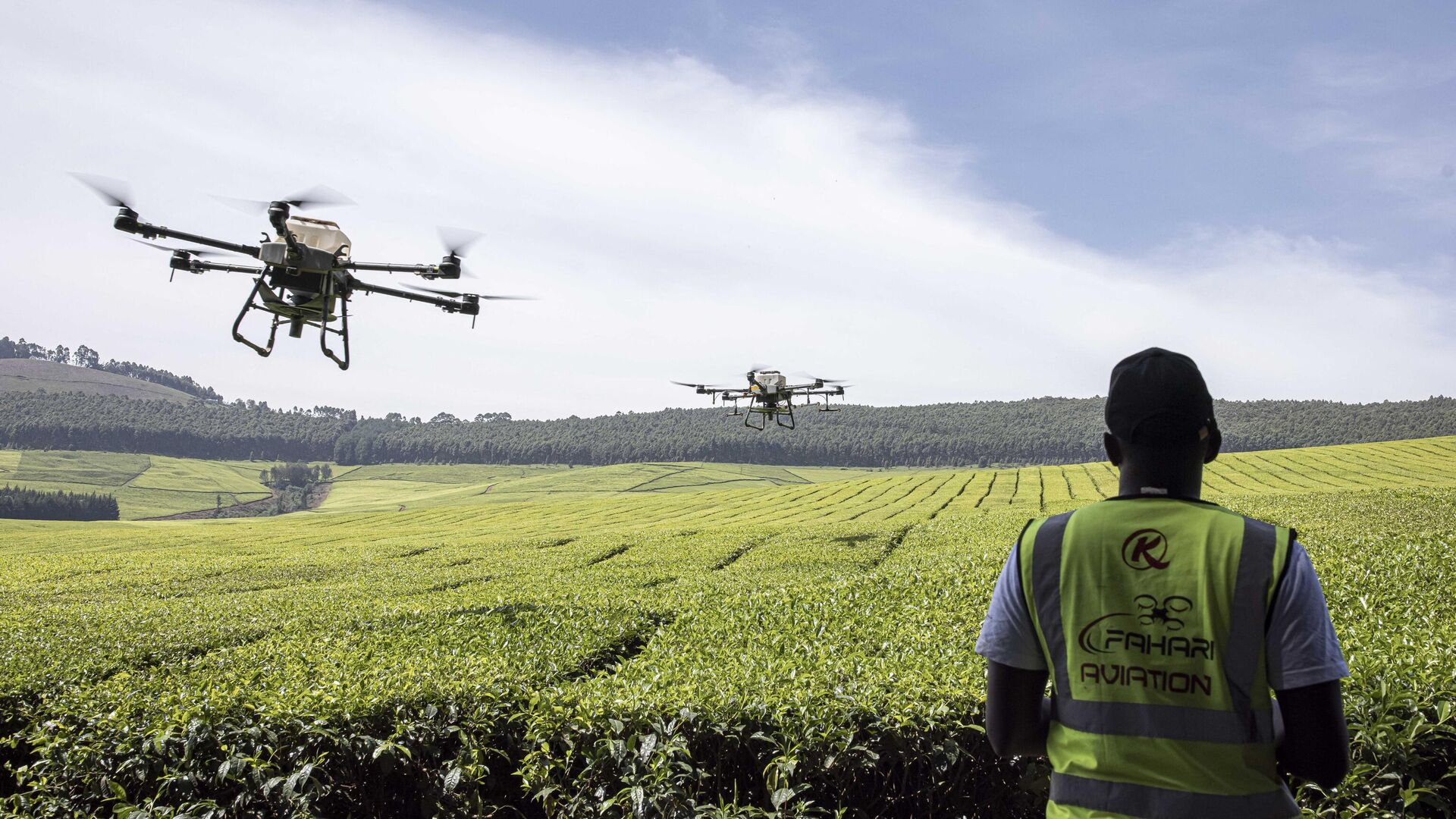https://sputnikglobe.com/20240130/switching-to-sustainable-food-system-could-create-up-to-10-trillion-in-benefits-a-year-1116482247.html
Sustainable Food System Switch Could Create Up to $10 Trillion in Benefits Yearly
Sustainable Food System Switch Could Create Up to $10 Trillion in Benefits Yearly
Sputnik International
If the global food system were overhauled, we could bring in trillions of dollars worth of benefits, according to a report published on Monday by the Food System Economics Commission (FSEC).
2024-01-30T05:10+0000
2024-01-30T05:10+0000
2024-01-30T09:14+0000
food
beyond politics
food chain
supply chain
food and agriculture organization
https://cdn1.img.sputnikglobe.com/img/07e8/01/1e/1116482834_0:161:3070:1888_1920x0_80_0_0_b6801740ad4349a8bdd184b7de2a5110.jpg
If the global food system were overhauled, we could bring in trillions of dollars worth of benefits, according to a report published on Monday by the Food System Economics Commission (FSEC).Currently, the way in which food is being produced, marketed, and consumed globally adds up to $15 trillion in losses a year—which is equivalent to 12% of the GDP in 2020.“The recent evolution of food systems has fuelled – and continues to inflame – some of the greatest and gravest challenges facing humanity, notably persistent hunger, undernutrition, the obesity epidemic, loss of biodiversity, environmental damage and climate change,” the report writes.The report found that our current food practices are responsible for a third of global greenhouse gas emissions, including those which arise from deforestation which result in the “net loss of over 6 million hectares of natural forest” every year and result in environmental costs of about $3 trillion. And if we continue down this path, we will reach a warming effect of 2.7C by the end of the century.“Food production in many countries becomes increasingly vulnerable to climate change and environmental degradation, with the likelihood of extreme events dramatically increasing,” says the FSEC.Health costs, the report estimates, is equivalent to about $11 trillion per year: the negative effects of labor productivity are caused by the ill health linked to our current food system. If we continue down the path of our current food system, the study says, then 640 million people will be underweight by 2050, while rates of obesity in other parts of the world will increase by 70%.Our current food system also contributed to a source of structural poverty through the costs of goods and the low incomes of those who work in food production, the report says. The rate of food poverty tends to be higher in agriculture than in the other divisions of food labor systems.Current policy commitments, says the FSEC, will not do enough to derail the current global food system from its unsustainable path. But the commission claims that they have created a pathway which they have titled the Food System Transformation (FST).The FST could provide economic benefits of $5 trillion to $10 trillion, the report claims. This system could “eliminate” undernutrition by 2050, and save 164 million lives from premature deaths due to poor health, grant farmers a sufficient income, and protect an additional 1.4 billion hectares of land while a further “200 million hectares are afforested”.The FST plan could also reverse biodiversity loss, reduce demand for irrigation water and almost cut in half nitrogen surplus from agriculture and natural land, the report adds. They also claim that this new plan could ensure that global warming is limited to well below the 1.5C Paris Climate target by the end of the century. This plan could also reallocate about 75 million more on-farm jobs to other segments of food systems or other sectors than expected under “current trends”.The report comes just after the UN’s Food and Agriculture Organization released research in November that estimated the hidden cost of food systems across the world to be about $10 trillion a year.
https://sputnikglobe.com/20231210/many-americans-are-unable-to-afford-food-even-as-unemployment-remains-low-1115515039.html
https://sputnikglobe.com/20231202/russia-to-ship-200000-tons-of-grain-to-africa-1115341925.html
https://sputnikglobe.com/20240129/french-farmers-stage-protest-blocking-roads-to-paris-1116469942.html
Sputnik International
feedback@sputniknews.com
+74956456601
MIA „Rossiya Segodnya“
2024
News
en_EN
Sputnik International
feedback@sputniknews.com
+74956456601
MIA „Rossiya Segodnya“
Sputnik International
feedback@sputniknews.com
+74956456601
MIA „Rossiya Segodnya“
food consuption, food supply, food chain, suppl chain, food production, sustainable food system
food consuption, food supply, food chain, suppl chain, food production, sustainable food system
Sustainable Food System Switch Could Create Up to $10 Trillion in Benefits Yearly
05:10 GMT 30.01.2024 (Updated: 09:14 GMT 30.01.2024) The commission has proposed a plan to overhaul food production across the globe that could save lives as well as economic costs.
If the global food system were overhauled, we could bring in trillions of dollars worth of benefits, according to a
report published on Monday by the Food System Economics Commission (FSEC).
Currently, the way in which food is being produced, marketed, and consumed globally adds up to $15 trillion in losses a year—which is equivalent to 12% of the GDP in 2020.
“The recent evolution of food systems has fuelled – and continues to inflame – some of the greatest and gravest challenges facing humanity, notably persistent hunger, undernutrition, the obesity epidemic, loss of biodiversity, environmental damage and climate change,” the report writes.
“The economic value of this human suffering and planetary harm is well above $10 trillion a year, more than food systems contribute to global GDP. In short, our food systems are destroying more value than they create.”

10 December 2023, 22:55 GMT
The report found that our current food practices are responsible for a third of global greenhouse gas emissions, including those which arise from deforestation which result in the “net loss of over 6 million hectares of natural forest” every year and result in environmental costs of about $3 trillion. And if we continue down this path, we will reach a warming effect of 2.7C by the end of the century.
“Food production in many countries becomes increasingly vulnerable to climate change and environmental degradation, with the likelihood of extreme events dramatically increasing,” says the FSEC.
“Rising food prices due to climate or other shocks heighten poverty and hunger, stretching the budgets of the poor and middle classes. This leads to social tensions and the imposition of measures to limit trade.”
Health costs, the report estimates, is equivalent to about $11 trillion per year: the negative effects of labor productivity are caused by the ill health linked to our current food system. If we continue down the path of our current food system, the study says, then 640 million people will be underweight by 2050, while rates of obesity in other parts of the world will increase by 70%.
Our current food system also contributed to a source of structural poverty through the costs of goods and the low incomes of those who work in food production, the report says. The rate of food poverty tends to be higher in agriculture than in the other divisions of food labor systems.
Current policy commitments, says the FSEC, will not do enough to derail the current global food system from its unsustainable path. But the commission claims that they have created a pathway which they have titled the Food System Transformation (FST).
The FST could provide economic benefits of $5 trillion to $10 trillion, the report claims. This system could “eliminate” undernutrition by 2050, and save 164 million lives from premature deaths due to poor health, grant farmers a sufficient income, and protect an additional 1.4 billion hectares of land while a further “200 million hectares are afforested”.

2 December 2023, 12:20 GMT
The FST plan could also reverse biodiversity loss, reduce demand for irrigation water and almost cut in half nitrogen surplus from agriculture and natural land, the report adds. They also claim that this new plan could ensure that global warming is limited to well below the 1.5C Paris Climate target by the end of the century. This plan could also reallocate about 75 million more on-farm jobs to other segments of food systems or other sectors than expected under “current trends”.
“There is no longer time to delay the inevitable — this report highlights the steps that policymakers must take now to create a healthier, more sustainable future,”
Michael Pollan, a food writer and Harvard professor, said. “The restructuring of food systems is indisputably one of the greatest opportunities we have to reverse decades of damage to both the planet and to human health.”
The report comes just after the UN’s Food and Agriculture Organization released research in November that estimated the hidden cost of food systems across the world to be about $10 trillion a year.

29 January 2024, 14:47 GMT





